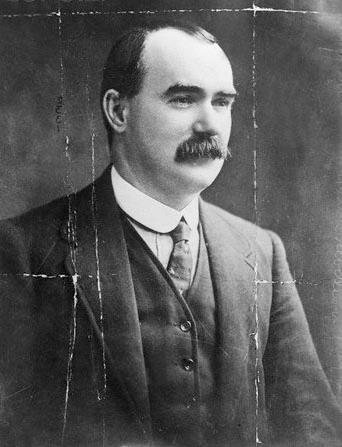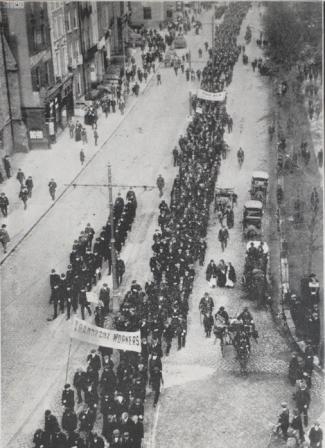
 During Easter week Jacobs factory was occupied by the 2nd battalion of Irish volunteers under the command of Tomás Mac Donnagh. They saw very little combat, unlike the ICA battalion in St. Stephen’s Green close by.
During Easter week Jacobs factory was occupied by the 2nd battalion of Irish volunteers under the command of Tomás Mac Donnagh. They saw very little combat, unlike the ICA battalion in St. Stephen’s Green close by.
A prominent Dublin employer, Jacobs had been a player in escalating tensions between organised labour and the business elite, of the previous decade which contributed to the Rising. They were one of the employers who dismissed union members in the Lockout of 1913, and in 1911 the factory came to a standstill when 3,000 of its female employees – including a young Rosie Hackett – embarked on a sympathy strike in support of the men.
The sympathetic strike was a controversial weapon employed by the unions. Harking back to the tactic of boycott from the Land War –which Connolly would have witnessed himself while stationed in Ireland as a private in the British Army- it was an escalation of industrial dispute which illustrated Connolly’s belief that the conditions of individual workers was symptomatic of a wider issue of class conflict.
At the height of the lockout in 1913 Connolly wrote an article for, Joseph Plunkett’s publication, The Irish Review, explaining the thinking of ‘the sympathetic strike’. Here is an extract of his article.
 “What is the sympathetic strike? It is the recognition by the working class that their essential unity, the manifestation in our daily industrial relations that our brother’s fight is our fight, our sister’s troubles are our troubles, that we are all members of one another.
“What is the sympathetic strike? It is the recognition by the working class that their essential unity, the manifestation in our daily industrial relations that our brother’s fight is our fight, our sister’s troubles are our troubles, that we are all members of one another.
The union is evolving among its members a higher concept of mutual life, a realisation of their duties to each other and to community at large, and are thus building for the future in a way that ought to gladden the hearts of all lovers of the race. In contrast to the narrow, restricted outlook of capitalist class, and even of certain old-fashioned trade-unionism, with their perpetual insistence upon “rights”, this union insists, almost fiercely, that there are no rights without duties, and the first duty is to help one another.
For the immediate present, the way out of this deadlock is for all sides to consent to the formation of a conciliation board, before which all disputes must be brought. Let the employers insist upon levelling up the conditions of employment to one high standard; treat as an Ishmael any employer who refuses to conform and leave him unassisted to fight his battles with the union; let the union proceed to organise all workers possible, place all disputes as to wages before the Board for discussion, and only resort to strike when agreement cannot be reached by the board; and all employers would be interested in bringing the more obdurate and greedy to reason, strikes would be rare.
 Thus we will develop a social conscience, and lay the foundation for an orderly transformation of society in the future into a more perfect and juster social order.”
Thus we will develop a social conscience, and lay the foundation for an orderly transformation of society in the future into a more perfect and juster social order.”
During Easter Week,Jacobs factory, once seized by the rebels, saw very little conflict as the English forces bypassed it in preference for more strategic targets. In an interesting postscript to the story of Jacob’s, Thomas W. Bewley, secretary at Jacob’s, later wrote to Fr Aloysius Travers of the Order of Capuchin Friars Minor. His letter was accompanied by a cheque for £25 from the directors of Jacob’s to the Capuchins as a mark of appreciation ‘for the deep sense of thankfulness that our Factory was spared from serious injury during the time of the recent rebellion’.
Fr Aloysius returned the cheque, claiming that ‘any services that I may have rendered during the recent sad crisis were such as any other priest in the same circumstances would render’. He requested that the cheque be sent to the Lord Mayor’s Fund for the Relief of Distress.
20/01/17 Wexford Arts Centre
31/03/17, 8pm An Táin Arts Centre, Dundalk
02/04/17 5pm Seán O Casey Theatre, East Wall, Dublin
29/04/17 8pm Culturlann, Belfast
24/07/17 Folk Holidays Czech Rep
30/07/17 Skibereen Arts Festival
30/01/16 Dublin TBtradfest
31/01/16 Dublin TBtradfest
02/02/16 Derry DITMF
11/08/16 Lorient France
Festival Interceltique
16/08/16 Ennis
Fleadh Cheoil na hÉireann
30/09/16 Monoghan
Iontas Arts Centre
Album release gig in
Músaem an bPiarsach
St. Enda's Rathfarnham
15/10/16 ; 3:30pm
ART: 2016 is the Arts Council's programme as part of Ireland 2016. It is a diverse and distinctive public showcase of Irish art which will be presented across Ireland and abroad throughout the year. Key programme strands include the Open Call National Project Awards, which feature cutting-edge, contemporary art events in dance, visual arts, poetry and music; the Next Generation Bursary Awards which highlight the work of eighteen rising stars of Irish art; and A Nation's Voice, an open-air, free concert at Collins Barrack on Easter Sunday, featuring new choral and orchestral work by Shaun Davey and Paul Muldoon, and the voices of a 1,100-strong choir. The programme also includes a selection of national touring productions.
ART: 2016 is supported by the Department of Arts, Heritage and the Gaeltacht through its Ireland 2016 Centenary Programme and is created with a range of partners; local, national and international